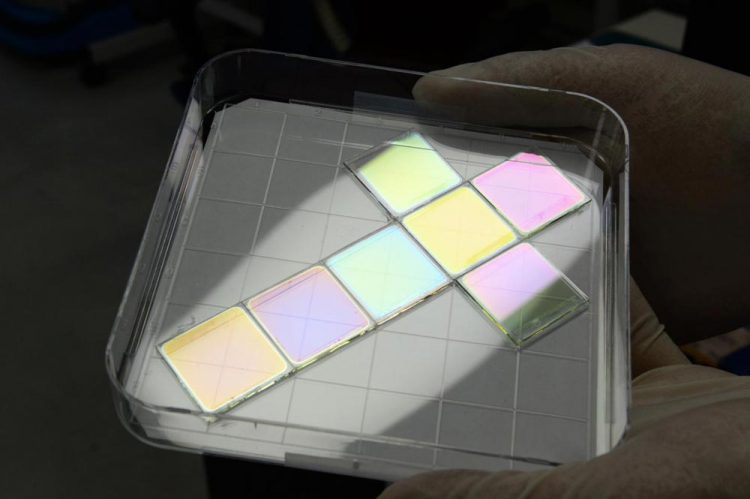ETRI develops eco-friendly color thin-film solar cells

The eco-friendly color CIGS thin film solar cells developed by ETRI researchers. Credit: Electronics and Telecommunications Research Institute (ETRI)
CIGS thin-film solar cells are used to convert sunlight into electrical energy and are made by coating multiple thin films on a glass substrate.
They have a relatively higher absorption coefficient among non-silicon based cells, resulting in high conversion efficiency and long stability. Also, they require less raw materials compared to silicon-based cells; hence less process and material costs.
One downside has been the difficulty in commercialization as they use the buffer layer which contains toxic heavy metal, cadmium. Thus, the ETRI team replaced the cadmium sulfide (CdS) buffer layer with zinc (Zn) based materials– which is not harmful — and managed to achieve approximately 18% conversion efficiency; thus eliminating the obstacle to commercialization.
Likewise, the availability of more than 7 colors including purple, green, and blue — without the need for additional process or cost — means one step closer to full-on commercialization.
Moreover, the researchers succeeded in identifying a new analysis method using photo-pumping terahertz spectroscopy and a mechanism for improving the conversion efficiency of solar cells with Zn-based buffer layers.
The solar cells are only 3? thick and can be coated on a flexible substrate as well as a glass substrate. This means that they could be bent or folded, expanding applications as a next-generation eco-friendly energy source.
“This technology will contribute to the solar power system development through the production of high value-added color photovoltaic modules,” said Yong-Duck Chung, the ETRI principal researcher.
The excellence of the research was proven by its publication in 'Nano Energy' and 'Progress in Photovoltaics: Research and Applications' as the cover article, globally esteemed international journals in the energy sector.
###
About Electronics and Telecommunications Research Institute (ETRI) (https:/
ETRI is a non-profit government-funded research institute. Since its foundation in 1976, ETRI, a global ICT research institute, has been making its immense effort to provide Korea a remarkable growth in the field of ICT industry. ETRI delivers Korea as one of the top ICT nations in the World, by unceasingly developing world's first and best technologies.
Media Contact
More Information:
http://dx.doi.org/10.1016/j.nanoen.2020.104855All latest news from the category: Power and Electrical Engineering
This topic covers issues related to energy generation, conversion, transportation and consumption and how the industry is addressing the challenge of energy efficiency in general.
innovations-report provides in-depth and informative reports and articles on subjects ranging from wind energy, fuel cell technology, solar energy, geothermal energy, petroleum, gas, nuclear engineering, alternative energy and energy efficiency to fusion, hydrogen and superconductor technologies.
Newest articles

Wildfire danger to increase due to climate change
WSL Institute for Snow and Avalanche Research (SLF) researchers expect an elevated wildfire danger in the Alpine Foreland from 2040 onwards due to changing meteorological conditions. The danger currently remains…

Advanced Brain Science Without Coding Expertise
Researchers at Helmholtz Munich and the LMU University Hospital Munich introduce DELiVR, offering a new AI-based approach to the complex task of brain cell mapping. The deep learning tool democratizes…

Gentle defibrillation for the heart
Using light pulses as a model for electrical defibrillation, Göttingen scientists developed a method to assess and modulate the heart function. The research team from the Max Planck Institute for…





















